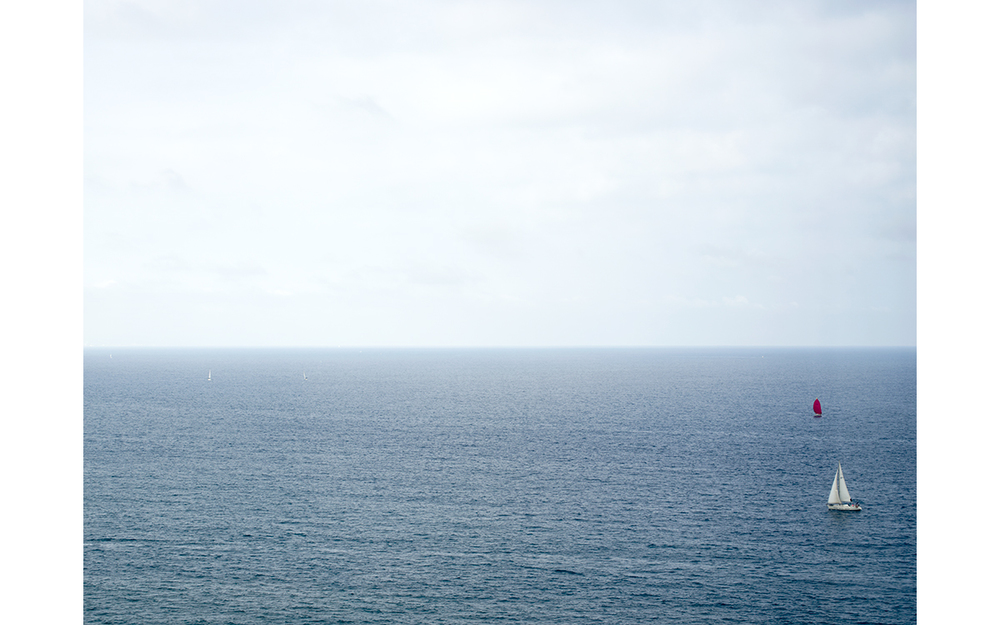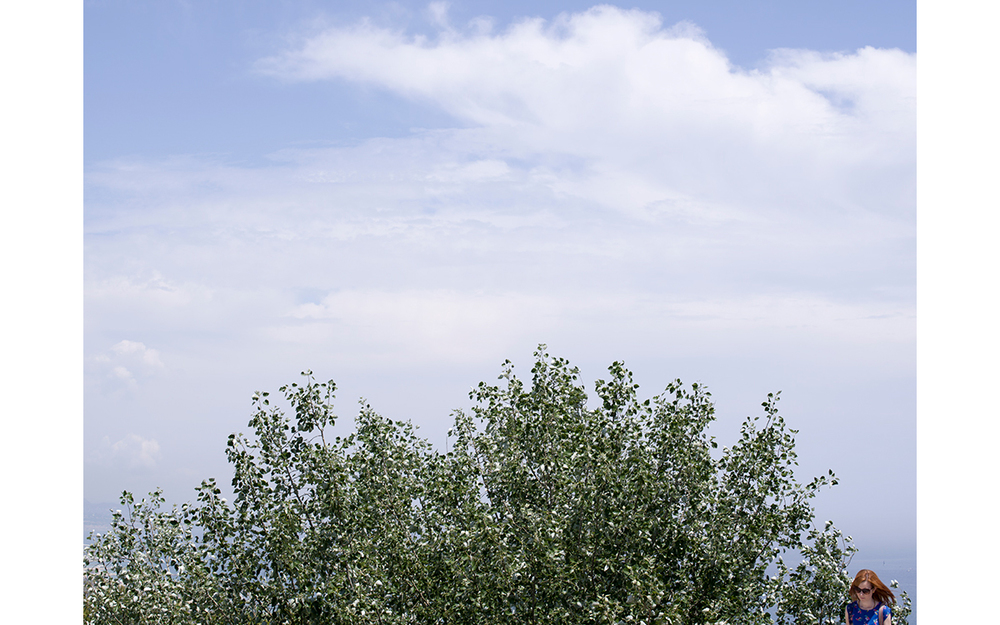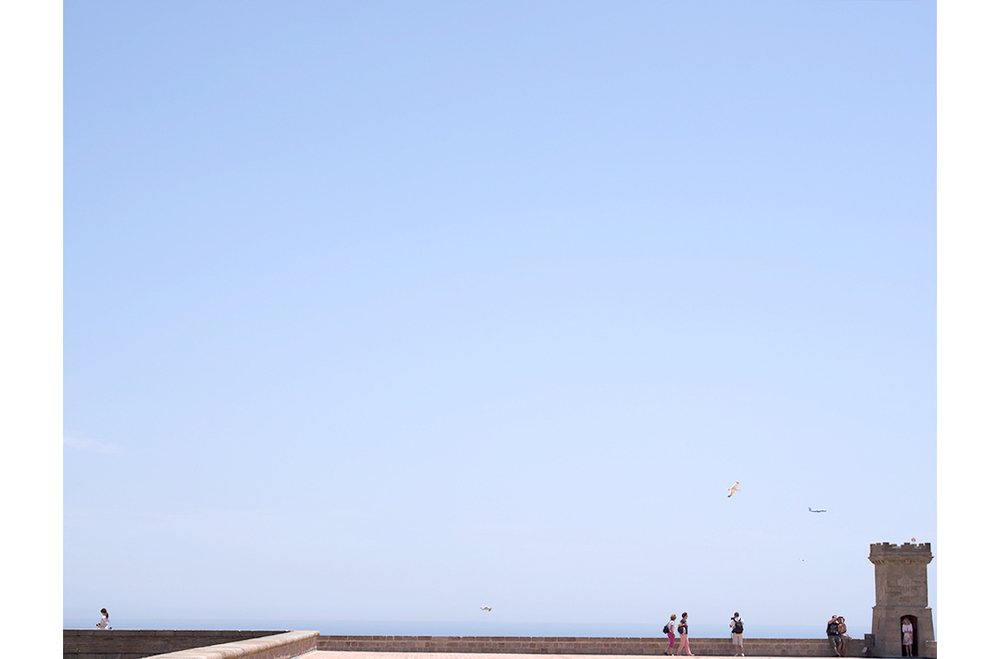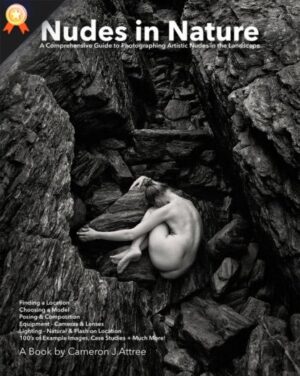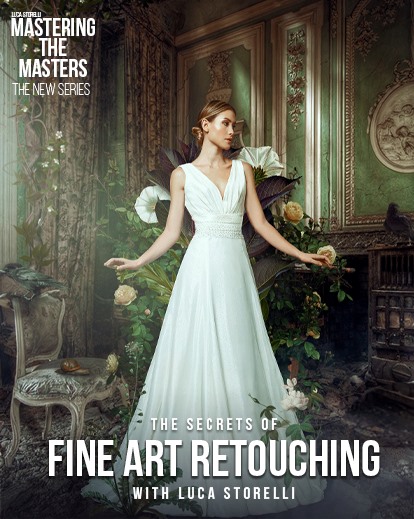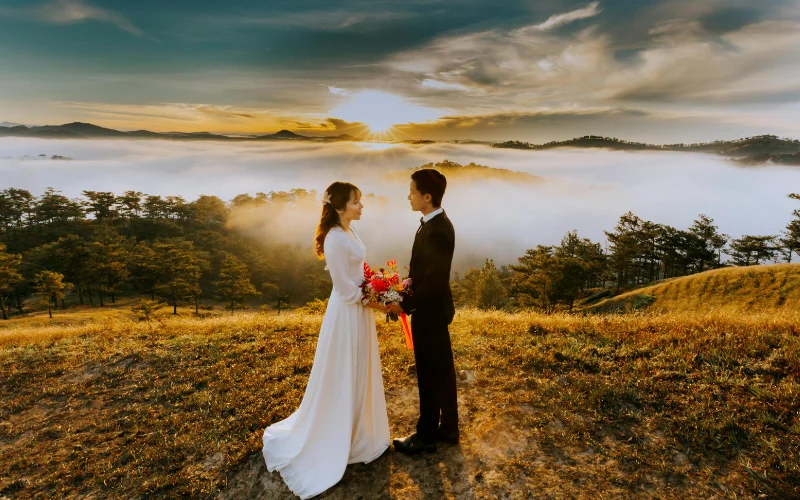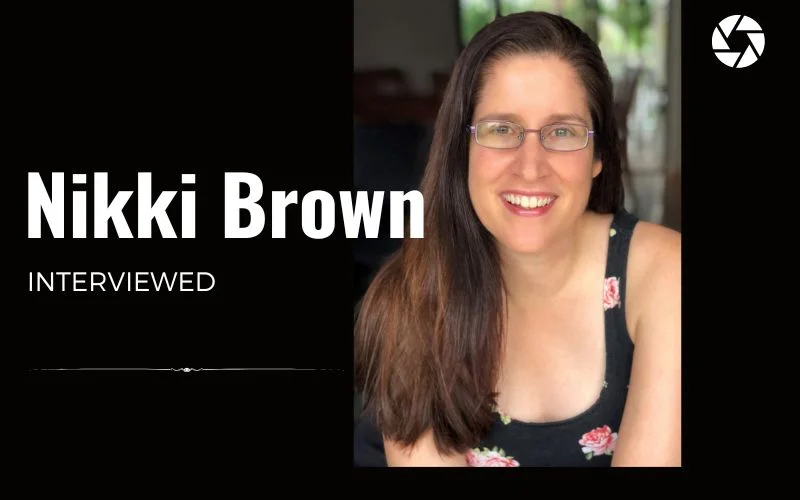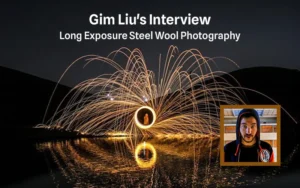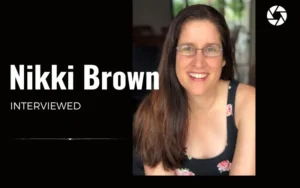Landscape Photography Tips by Teri Fullerton
While in Barcelona, this past summer, Teri Fullerton, a Minneapolis-based photographer known for portraits of veterans returning from war, shifted her attention to a subject more often taken for granted than well shot. In photographing the landscape and how people—whether tourists, beach-goers, or other photographers—experience its beauty, she sought clear evidence of wonder.
Awe, the Small Self, the series started in Barcelona, is self-referential. Photographs of the landscape include portraits of other people shooting the same scene. “I was interested in observing other people looking and the complicated relationship between being and documenting,” she writes. The photographs also present a vast backdrop of ocean and sky. When seen from this scale, the body becomes small, the land more pronounced. “The world is infinitely large and man is a small player . . . [the camera] helps us appreciate our place in the world by paying close regard to it.”
I talked with Fullerton over email about her ideas on photography and Awe, the Small Self.
Do photographers capture a moment of the world or create one? Is a photo something that they’ve read from reality or something that they’ve written in? Something else? What do you think?
Photographers do both—quickly and off the cuff. We capture what is in front of us and/or we also curate and narrate all aspects of the frame. I talk to my students a lot about the difference between “taking” a photograph or “making” a photograph. Although I don’t believe there is an inherent hierarchy, both have their place.
These questions bring to mind John Szarkowski’s essay and accompanying exhibition, “Mirrors and Windows,” from the 1970’s, in which he compares photographs that act as mirrors (or reflect the artists’ individual ideas—staged, tableau, conceptual, premeditated) versus photographs that one might take through the window (perceiving the world as it is and capturing its reality). He also argues that they are not exclusive categories but rather there is a fluid continuum. Think Cindy Sherman’s studio practice compared to James Nachtwey’s war photography.
To take a question from one of my favorite writers: does shooting photography help make the anguish of life more bearable?
The question reminds me of a Joseph Campbell quote, one that has really stuck with me:
“…the joyful participation in the sorrows of the world.”
I’ve often come back to that quote when making videos and photographs with soldiers that have served during wartime. They do not joyfully participate in the sorrows of war—rather, they have an inherent need for both self-preservation and for hope in the face of adversity.
I came to working with soldiers because my brother served two terms in Iraq as an Apache helicopter pilot. I was very interested in what it means to have gone to war and what it means to return. Among the prominent ailments that affect veterans is a new term that has been deemed “moral injury.” It is explained as not necessarily having done something wrong but having seen or experienced things that go against one’s moral compass.
I believe that making photographs has the potential to raise awareness and understanding of the world and its subjects—perhaps reducing the anguish of life but never eliminating it. A photographer’s intention can of course be at odds with the viewer’s perception.
How did you get your start in photography?
My main influences were my father and music. My father was a hobbyist photographer. He had a wooden 4 x 5 view camera that he would strap on his BMW touring motorcycle and take off for trips through Mexico. His interest was the landscape mostly but also quiet, posed portraits.
Music was my other introduction to creativity. I wasn’t a musician, but I was introduced to punk rock as a sophomore in high school, and it became a large part of how I identified myself as a young person. I grew up in South Lake Tahoe, California in the 80s at a time when punk rock was an unknown genre. Photography became my creative outlet.
Did you ever feel like giving up? Were you ever unsure of your talents?
Maybe when it was more so a part-time gig, but now it’s just simply what I do. At times I am uninspired by the field of photography and find it exhausting to find originality in the medium, but that’s why we draw from other areas—literature, installation, video, music.
Yes, I have been unsure of my talents. There are so many photographers, and it’s hard at times to avoid comparing yourself against the vast field. The intimidation for me comes when I feel like it is time to move on, and I’m unsure of what I’d like to do next. There can be a stretch where it feels as though you will never have an idea again. I’ve come to think of it as a healthy hibernation.
Awe, the Small Self made me wonder about your own view of the world. When you look up to the world, what do you see? Reality or something more fantastic? Have you ever lost yourself in wonder?
The title, “Awe, the Small Self and Prosocial Behavior” is a psychological study that I read about in a New York Times article entitled “Why Do We Experience Awe?” The findings of the study suggest that “awe helps bind us to others, motivating us to act in collaborative ways that enable strong groups and cohesive communities.” It goes on to talk about the phenomena of goose bumps and their connection to awe. I don’t know that I’ve necessarily been lost in wonder, but I do know that I’ve certainly experienced it.
Most of the work from that series was taken this summer in Barcelona, Spain. Our hunger to document, especially in awe-inspiring places, is obvious. I sometimes feel at odds with the need to catalog my experiences—the need of evidence that we were here instead of simply being here. In Barcelona, I was interested in observing other people looking and the complicated relationship between being and documenting.
It’s not hard to see how important the ocean figures in this project. What are your thoughts on the term “oceanic feeling”? What does being beside the ocean feel like to you?
I’ve not heard of the term, but I think I get the gist. The ocean seems limitless and unknowable. Water stands in for everything from rebirth to drowning. There is so much beauty, strength, danger, and otherworldliness to the ocean. It represents the fantasy of a voyage and departure, and yet so much more.
There are books written on the theory of the sublime in accordance with nature, and certainly the ocean is an abundant topic. The thesis statement here might be surmised as follows: the world is infinitely large and man is a small player, but the world can also be over romanticized and come off like an HDR photograph.
Water is certainly a recurring theme for me. When I was working with veterans that had gone to war, I also made videos of them swimming in natural bodies of water. The water was a way to explore the duality of not feeling at home—a place somewhere between—after going to war.
I also dream about oceans and lakes quite frequently. You make work about what you know, and what you want to know.
Ultimately, what do you think the camera reveals about perspective? Does it allow us a greater appreciation for our place in the world? Or diminish it?
Ideally, the camera helps you uncover and amplify new perspectives. I have a hard time composing on any camera without a viewfinder: it’s that rectangle/square that allows me to dissect a scene and identify the harmony or, if sought, disharmony. The viewfinder helps me find a new perspective, I guess it’s as simple as that. I suppose it helps us appreciate our place in the world by paying close regard to it.
What have you learned about yourself from shooting photography? Any surprises?
That’s a hard question. I think it’s obvious to consider what you learn about the world, but much tougher to ponder what you learn about yourself through making photographs. In a way it has taught me how to participate, or at least given me an outlet to do so. I was a shy person when I was young. The camera has acted as an opening. It is a way for me to connect and reflect on the world.
All images © Teri Fullerton.
Learn more landscape photography tips on her website here.

